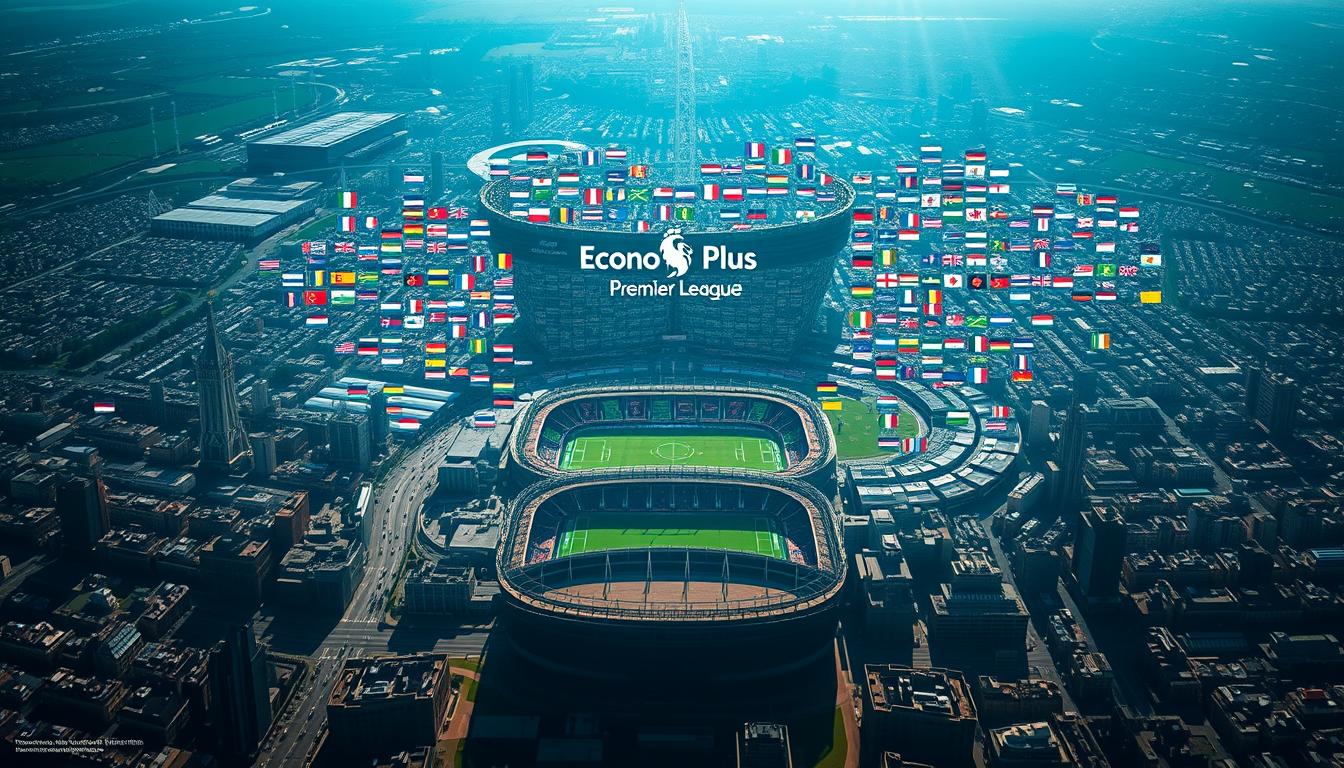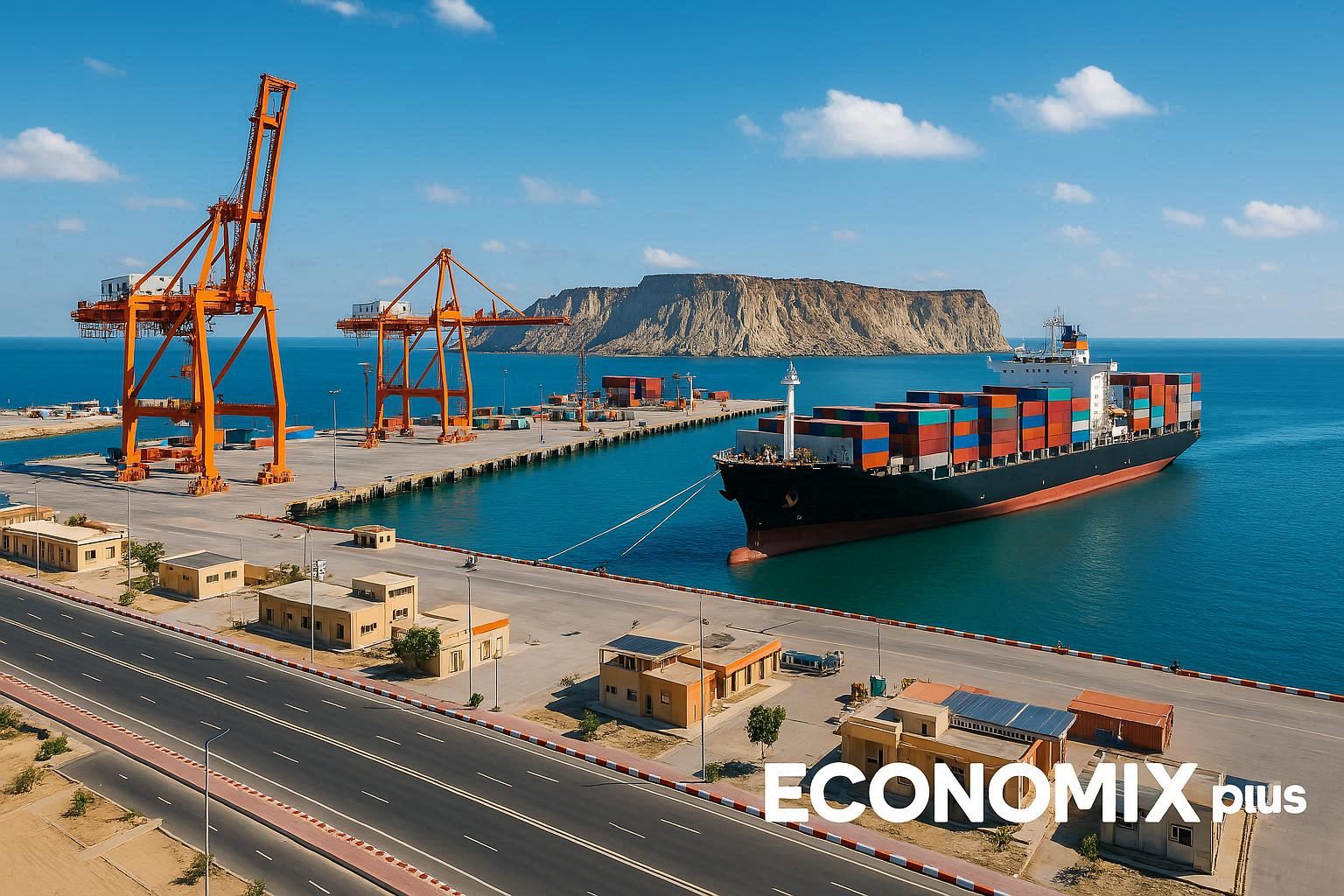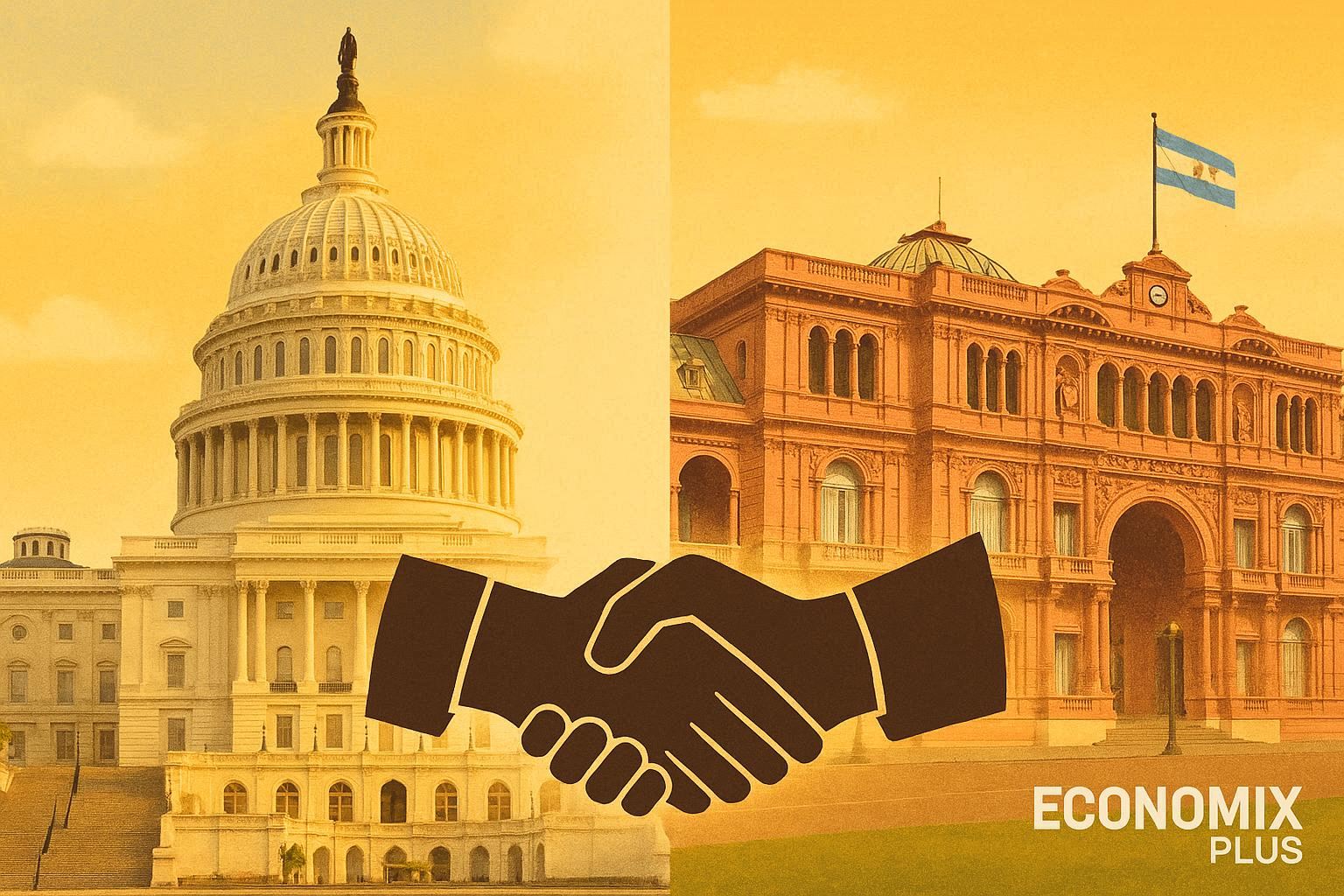Can a sports league be a driving force behind a nation’s economy? The Premier League has become a global phenomenon, captivating audiences worldwide with its high-stakes matches and world-class players.
The Premier League’s economic impact is substantial, with its clubs contributing £8 billion to the UK economy during the 2021/22 season. This significant contribution has been on the rise, increasing by £400 million from the previous assessment.
The league’s global reach is undeniable, with a TV audience of over 1.5 billion and average stadium crowds of more than 40,000. As the Premier League continues to grow, its influence on local communities, national economies, and global business networks is becoming increasingly evident.
Key Takeaways
- The Premier League is a significant economic force in global sports.
- The league’s contribution to the UK economy is substantial.
- The Premier League’s global reach is vast, with a large TV audience.
- The league’s business model is being studied and emulated globally.
- The Premier League’s impact on local communities is considerable.
The Rise of the Premier League’s Economic Dominance
Since its inception in 1992, the Premier League has experienced remarkable economic growth, evolving into a global sports powerhouse. The league’s strategic focus on international expansion has been a key driver of this success, transforming it from a modest domestic competition into a global sports juggernaut.
From Local Competition to Global Powerhouse
The Premier League’s journey to becoming a global economic force began with a shift in broadcast revenues. Initially, broadcast revenues were primarily generated in the UK, but the league’s latest broadcast deal, running from 2022-25, is worth £5 billion in the UK and slightly more abroad. This significant increase in broadcast revenue has essentially turned football into an export industry, funnelling a huge amount of foreign cash into the UK.
The league’s strategic expansion has enabled it to attract a global audience, with the 20 clubs generating over £5 billion in revenue last year. This revenue comes from three main sources: matchday revenue, commercial revenue, and broadcast revenue. The diversification of revenue streams has created a resilient economic model that has continued to grow even through global economic downturns.
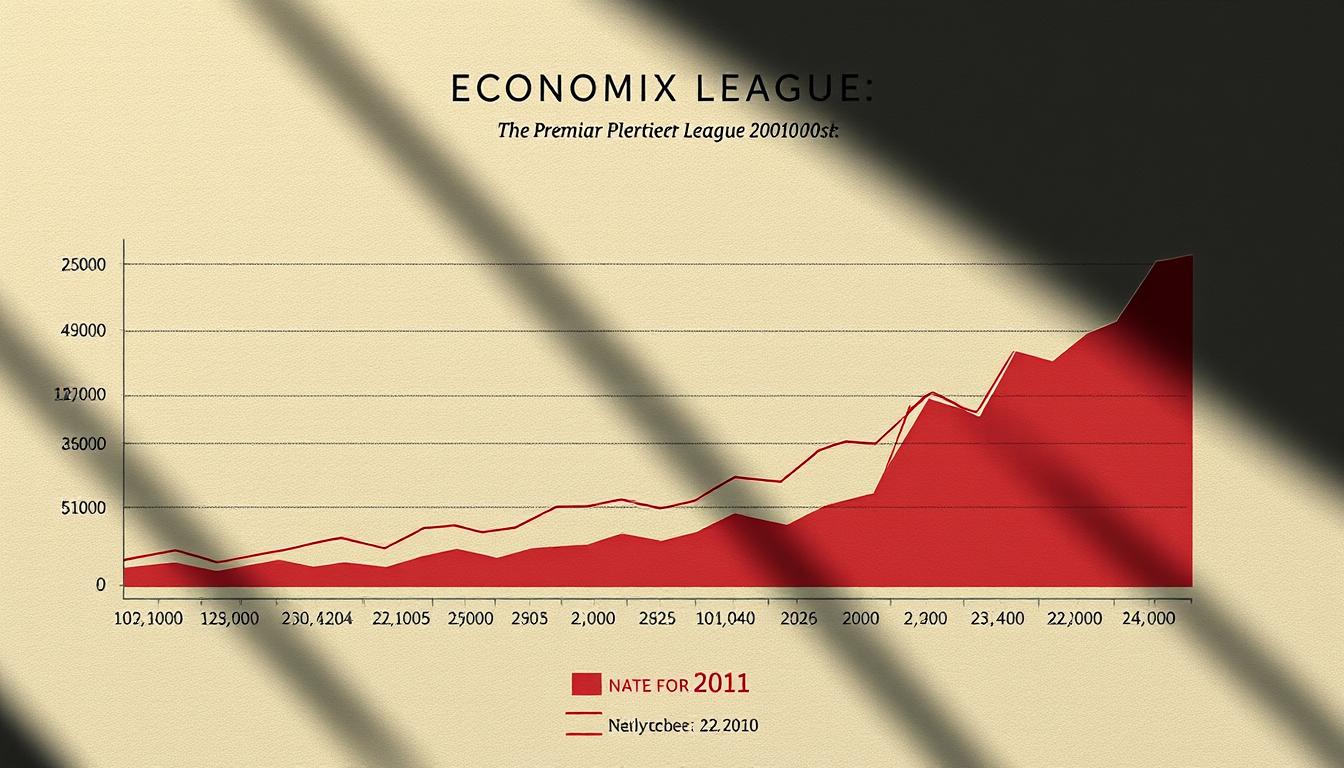
Record-Breaking Revenue Streams
The Premier League’s commercial success has enabled unprecedented investment in player talent, with clubs able to attract the world’s best players through competitive wages and world-class facilities. The league’s record-breaking revenue streams have fundamentally changed the economics of football, with Premier League clubs now operating as sophisticated global businesses rather than traditional sports organizations.
The rapid growth in revenue over the last few years is a testament to the league’s ability to adapt and thrive in a changing economic landscape. As the Premier League continues to expand its global reach, it is likely that revenue will continue to increase, further solidifying its position as a dominant force in the global sports industry.
The English Premier League as a Global Economic Force
The Premier League’s transformation into a global economic force is attributed to its successful branding, international broadcasting rights, and strategic commercial partnerships. This transformation has not only elevated the league’s status but also contributed significantly to the global economy.

Broadcasting Rights and International Appeal
Broadcasting rights have become the heart of the Premier League’s global economic model. International broadcast deals now exceed domestic revenue, creating unprecedented worldwide exposure for clubs and their commercial partners. The Premier League’s international appeal has transformed it into a powerful export industry for the UK, bringing billions in foreign revenue into the domestic economy through various channels.
The global broadcast of Premier League matches has made it a staple in many countries, with fans eagerly following their favorite teams. This widespread viewership has attracted global brands looking to tap into the Premier League’s vast audience, resulting in lucrative sponsorship deals.
Commercial Partnerships and Global Brand Value
Commercial partnerships between Premier League clubs and global brands have created mutually beneficial relationships that extend far beyond traditional sponsorship. These partnerships have developed into sophisticated marketing ecosystems worth billions annually. The Premier League’s clubs function as cultural ambassadors, introducing millions of people worldwide to British culture, cities, and businesses, and creating economic ripple effects that extend far beyond match days.
The global fan engagement model has evolved from passive viewership to active participation through digital platforms, creating new revenue streams and commercial opportunities that weren’t possible in previous decades. This shift has enabled clubs to connect with fans globally, fostering a loyal fan base that contributes to the league’s economic success.
Tourism and International Fan Engagement
Tourism driven by international fans represents a significant economic impact, with research showing that Premier League matches attract hundreds of thousands of international visitors who contribute substantially to local economies. These fans become ambassadors for local tourism, often sharing their experiences with others through social media or word of mouth, thereby promoting tourism in cities and towns that might otherwise be less well-known.
The cultural exchange between international fans and local communities is also an important factor. As a result, the Premier League serves not only as a sporting spectacle but also as a driving force in promoting tourism and stimulating local economies.
Economic Impact on Communities and the Nation
The Premier League’s influence extends far beyond the football pitch, having a significant economic impact on communities and the nation as a whole. The League’s success has generated widespread benefits for the economy and society, demonstrating its role as a major economic force.
Job Creation and Employment Opportunities
The Premier League supports over 90,000 jobs across the country, in various sectors such as direct employment at clubs, hospitality, security, retail, and media. These jobs are crucial for the local economies, providing employment opportunities and contributing to the overall economic well-being of the nation.
Tax Contributions to the UK Economy
The Premier League and its clubs made a direct tax contribution of £4.2 billion to the UK Exchequer in the 2021/22 season, with £1.7 billion of this amount accounted for by the League’s players and staff. This significant tax contribution highlights the substantial economic impact of the Premier League on the national economy.
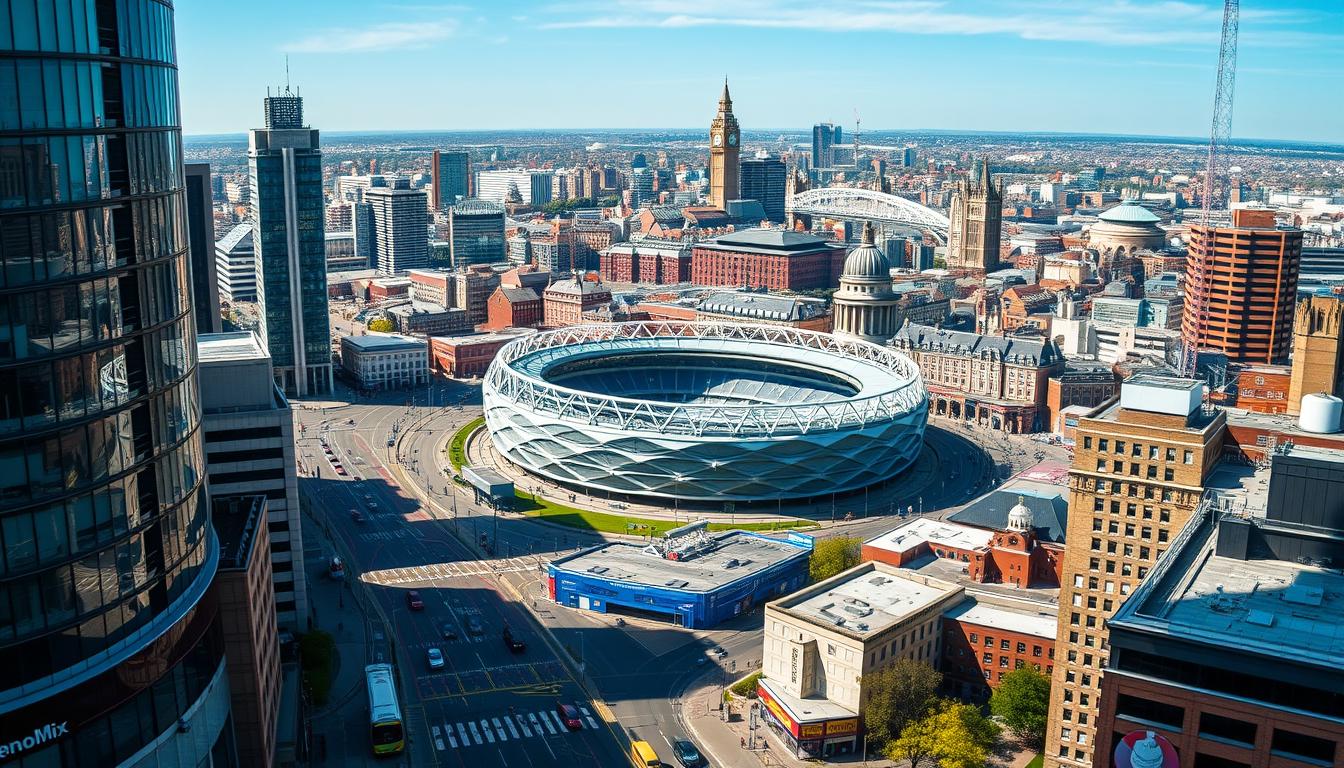
Stadium Development and Infrastructure Investment
Premier League clubs have driven stadium development and infrastructure investment, transforming urban landscapes and creating long-term economic assets for communities. These investments often serve as catalysts for broader neighborhood revitalization, contributing to the economic growth and development of the surrounding areas.
| Region | Jobs Supported | Economic Impact (£ billion) |
|---|---|---|
| North West | 33,000 | 3.3 |
| Outside London | – | 5 |
| Total | 90,000+ | – |
The distributed nature of Premier League clubs across different cities and regions means that the economic benefits reach communities throughout the country, rather than being concentrated in a single area. This widespread impact underscores the Premier League’s role in promoting balanced regional development and contributing to the overall economic health of the nation.
Challenges and Future Outlook
The Premier League’s economic influence extends far beyond the pitch, with far-reaching implications for local communities and the national economy. While the league has achieved significant economic success, it also faces several challenges that need to be addressed to ensure its continued growth and sustainability.
One of the key challenges is the uneven distribution of benefits, with concerns that the wealth generated by the Premier League does not always reach all parts of local communities. The economic impact of Premier League clubs can contribute to gentrification in surrounding areas, as property values increase and potentially displace long-time residents. This creates tension between economic growth and community preservation, highlighting the need for a balanced approach.
The post-pandemic recovery has shown the resilience of the Premier League’s economic model, with clubs returning to profitability after the significant disruptions of the COVID-19 period. Future growth opportunities include further international expansion, particularly in emerging markets, and technological innovations in how fans engage with matches. However, maintaining competitive balance within the league while addressing concerns about wealth concentration among a small number of elite clubs will be crucial to the Premier League’s continued economic success.
- The Premier League faces regulatory challenges, with the UK government’s plans for a football regulator aiming to balance commercial success with wider benefits for the game.
- Sustainability initiatives are becoming increasingly important for Premier League clubs, with environmental and social responsibility programs essential for long-term economic viability.
- The economic data from recent seasons suggests that Premier League clubs are adapting to changing market conditions, with record attendance figures demonstrating the enduring appeal of live matches.
In conclusion, the Premier League’s economic impact is a complex and multifaceted phenomenon, influenced by various factors such as broadcasting rights, commercial partnerships, and fan engagement. As the league continues to evolve, it is essential to address the challenges and capitalize on the opportunities to ensure its continued success and sustainability.
